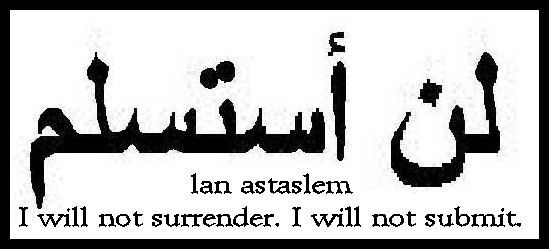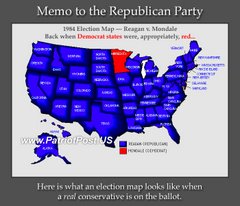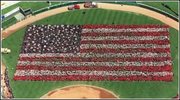http://www.mpac.org/assets/docs/publications/MPAC-defamations-of-religion.pdf
MPAC takes a legalistic & libertarian tack against blasphemy laws, asserting that the Qur'an supports open debate, not compulsion. Lets look a little deeper, below the surface of a few crucial citations. [Links added to quotes.]
Let there be no compulsion in religion, the truth stands out clear from error… (
2:256)
Say: O ye that reject Faith,! I worship not that which ye worship, Nor will ye worship that
which I worship, And I will not worship that which ye have been wont to worship, Nor will ye
worship that which I worship, To you be your Way, and to me mine (
109:1-6)
He was not permitted to force people to believe. (
17:53-54;
88:21-22)
If the Prophet was commanded directly by God to just advise and persuade, who are we as ordinary
human beings to claim a higher mantle of authority and impose our beliefs on others?
mentions relation to the Ansar, whose children were among the Banu an-Nadir who were exiled from Medina. Unfortunately, Ibn Kathir leaves the story open ended, I suspect that there was an editing error somewhere along the way. Other tafsirs complete the story and add more details.
Certain women among the Ansar, whose sons died in infancy would swear to raise one who lived as a Jew. Evidently they farmed their surviving sons out to wet nurses among the Banu an-Nadir. When Moe drove the Banu an-nadir from their fortifified settlements [
59:2,
The End that Bani An-Nadir suffered] some of the Answar offspring opted to remain among the exiled Jews. Their mothers ran complaining to Moe, who revealed 2:256 to fit the occasion. The story finds its fullest explication in these tafsirs:
Mufti Shafi Usmani brings in a related argument not raised by the others in this context: the relationship between non compulsion and jihad, holding that the two are not in conflict.
Keeping this verse in view, some people raise objections. They say this verse tells us that there is no compulsion in faith, although the teaching of jihad and qital (fighting) in Islam appears contrary to this principle. Looking at this a little carefully, we can find out that the objection
is not valid, since
the teaching of jihad and qital in Islam is not to coerce people into accepting Faith. Had it been so, why would there be Islamic injunctions of jizyah to provide an umbrella of security for kuffar (disbelievers) which protects their life, property and honour? [...] It is for this reason that Allah Almighty has ordained that the
fasad created by these people should be removed by jihiid and qitl.
So, killing such people is like the killing of serpents, scorpions and their harmful likes. Usmani asserts that jihad is for the purpose of eradicating people who cause fitna, not about compelling them to convert to Islam. Note that he claims that jijya provides security for kuffar, protecting their life and property. From whom does jizya protect them? I have three clues for you, and will allow you to draw your own conclusion.
- These people have been informed of the orders about Jiziya. If you desire that there should be peace and security in the world, obey Allah and His Prophet. Thereafter none in Arabia and Ajam (Iran) shall dare cast an evil eye on you. But the rights of Allah and His Prophet can at no time be waived. If you do not accept these terms and set them aside, I do not need your presents and gifts. In that case, I shall have to wage war (to establish peace and security). Its result would be that the big ones shall be killed in war and the commoners shall be taken prisoners. [Letter to the rulers of Aqaba]
- [...]And whoever says: None has the right to be worshipped but Allah.' saves his wealth and his life from me[...] [Sahih Bukhari 9.92.388]
- Capitation tax is to be imposed upon Kitabees, because this is mentioned in the Koran: and it is in the same manner to be imposed upon Majoosees, as the prophet imposed capitation-tax upon Majoosees.-- Capitation-tax is also to be imposed upon the idolaters of ajim (Persia) this is contrary to the opinion of Shafii, for he argues that destruction is incurred by all infidels; but the legality of abstaining from it, in sconsideration of a capitation-tax, with respect to Kitabees, is known from the word of the Koran, and with respect to Majoosees, from the traditions; any others, therefore, than those, (namely idolaters,) remain subject to the original penalty, which is destruction. [Hedaya, Volume II, Book IX, Chapter VIII, Page 212]
In the matter of Surah Al-Kaafiroon,
Tafsir Ibn Kathir informs us that the surah was revealed about Kafirs who challenged Moe to swap religions for a year. Rather than a statement of tolerance, it is a statement of rejection and immunity from their shirk. [
He commanded His Messenger to disavow himself from their religion completely]
Tafsir al-tustari informs us that Surah 109 was abrogated by
9:5;
Tafsir al-Jalalayn &
Tafsir Ibn Abbas cuncurr, citing the "command to wage war" and "verses of fighting" respectively.
Surah Al-Kaafiroon was # 18 in seqeuence of revelation , Surah Al-Baqarah was # 87, both are abrogated by conflicting ayat in Surah At-Taubah which was next to last in revelation.
Does
Surah Al-Isra' 53-54 forbid compulsion? Perhaps we should examine the context.
17:53. And say to My slaves (i.e. the true believers of Islâmic Monotheism) that they should (only) say those words that are the best. (Because) Shaitân (Satan) verily, sows disagreements among them. Surely, Shaitân (Satan) is to man a plain enemy.
17:54. Your Lord knows you best, if He will, He will have mercy on you, or if He will, He will punish you. And
We have not sent you (O Muhammad ) as a guardian over them. 17:55. And your Lord knows best all who are in the heavens and the earth. And indeed, We have preferred some of the Prophets above others, and to Dawûd (David) We gave the Zabûr (Psalms).
17:56. Say (O Muhammad ): "Call unto those besides Him whom you pretend [to be gods like angels, Iesâ (Jesus), 'Uzair (Ezra), etc.]. They have neither the power to remove the adversity from you nor even to shift it from you to another person."
17:57. Those whom they call upon [like 'Iesa (Jesus) son of Maryam (Mary), 'Uzair (Ezra), angel, etc.] desire (for themselves) means of access to their Lord (Allâh), as to which of them should be the nearest and they ['Iesa (Jesus), 'Uzair (Ezra), angels, etc.] hope for His Mercy and fear His Torment. Verily, the Torment of your Lord is something to be afraid of!
17:58. And there is not a town (population) but
We shall destroy it before the Day of Resurrection, or punish it with a severe torment. That is written in the Book (of our Decrees)
I do not see mention of compulsion or toleration in that context, but I do see a threat of destruction, before the day of judgment. Perhaps you can find something of interest in
Ibn Kathir tafsir of 17:53.
Surah
Surah Al-Ghaashiyah 21-22 looks swell until we examine the context. Of course, Muslims, who accuse us of "cherry picking" are prone to engage in selectivity.
88:21. So remind them (O Muhammad ()),
you are only a one who reminds.
88:22.
You are not a dictator over them. 88:23.
Save the one who turns away and disbelieves 88:24.
Then Allâh will punish him with the greatest punishment.
Moe is only one who reminds, not a dictator; then comes the exception clause, which MPAC did not cite for us. Allah will punish the disbelievers. Of course, punishment is not coercion. Of course, Ibn Kathir had something to say about that. [
The Messenger is only charged with delivering the Message]
(You are not a Musaytir over them.) Ibn `Abbas, Mujahid and others said, "You are not a dictator over them.'' This means that
you cannot create faith in their hearts. Ibn Zayd said, "You are not the one who can force them to have faith.'' Imam Ahmad recorded from Jabir that the Messenger of Allah said,
(
I have been commanded to fight the people until they say La ilaha illallah (none has the right to be worshipped except Allah). So if they say that, they have safeguarded their blood and wealth from me - except for what is rightfully due from it - and their reckoning is with Allah, the Mighty and Majestic.)'' Then he recited, (So remind them - you are only one who reminds. You are not a dictator over them -) This is how Muslim recorded this Hadith in his Book of Faith, and At-Tirmidhi and An-Nasa'i also recorded it in their Sunans in the Books of Tafsir. This Hadith can be found in both of the Two Sahihs.
you are not a taskmaster over them (a variant reading [for musaytir] has musaytir, that is to say, [not one who has been] given authority over them) - this was [revealed] before the command to struggle [against the disbelievers]. [Tafsir al-Jalalayn] Moe can't make us believe, but he has been commanded to wage war upon us until we recite
Shahada. That is a clue for the clueless. Surah Al-Anfal & Surah At-Taubah contain the jihad imperatives refered to above. Because they were among the last to be revealed, they abrogate earlier verses whith which they are in conflict. [
2:106 &
16:101 establish the rule of abrogation.] The jihad imperatives are commands to fight idolaters until only Allah is worshiped and people of the book until they are subjugated & extorted.
8:39. And
fight them until there is no more Fitnah (disbelief and polytheism: i.e. worshipping others besides Allâh) and
the religion (worship) will all be for Allâh Alone [in the whole of the world ]. But if they cease (worshipping others besides Allâh), then certainly, Allâh is All-Seer of what they do.
9:29. Fight against those who (1) believe not in Allâh, (2) nor in the Last Day, (3) nor forbid that which has been forbidden by Allâh and His Messenger (4) and those who acknowledge not the religion of truth (i.e. Islâm) among the people of the Scripture (Jews and Christians), until they pay the Jizyah with willing submission, and feel themselves subdued.
Those imperatives are codified in Shari'ah, best exemplified by Reliance of the Traveller, Book O, Chapter 9.8 &
9.9. No compulsion? Fighting Arabian pagans until they become Muslim is not compulsion.
O9.9 The caliph fights all other peoples until they become Muslim (O: because they are not a people with a Book, nor honored as such, and are not permitted to settle with paying the poll tax (jizya) ) (n: though according to the Hanafi school, peoples of all other religions, even idol worshippers, are permitted to live under the protection of the Islamic state if they either become Muslim or agree to pay the poll tax, the sole exceptions to which are apostates from Islam and idol worshippers who are Arabs, neither of whom has any choice but becoming Muslim (al-Hidaya sharh Bidaya al-mubtadi' (y21), 6.48-49) ).
I am not arguing with MPAC about the negative impliciations of the "defamation of religions" meme. The points raised fy Freedom House and other critics are valid, based on solid facts and logic. I simply pointed out their practice of kitman: deception by obfuscation. But this subject is raised in the context of two resolutions passed this year by the Human Rights Council and General Assembly.
The name has changed; the language has changed, but the meme has not changed. The OIC & UN have not abandoned "combating defamation of Islam".
Adopting measures to criminalize the incitement to imminent violence
based on religion or belief;
¶5(f) on page 5 of Draft resolution XVII, "Adopting measures to criminalize" is a code phrase for legislation. They are demanding passage & enforcement to establish criminal punishment for publications such as Fitna, the Motoons and this blog post. Remember, Ban Ki-Moon defined the terms for us.
Reuters quotes U.N. Secretary General Ban Ki-moon about
Fitna:"There is no justification for hate speech or incitement to violence," Ban said in a statement. "The right of free expression is not at stake here." The resolutions demand passage and enforcement of legislation to criminalize criticmsm of Islam. Another resolution, flying below the radar, passed the GA by concensus, without a vote. ¶10, on page 3 of
Draft resolution XVIII, emphasizes that Islam must not be equated with terrorism Equation with terrorism fits the defamation meme, and it has not been dropped or abandoned by the UN, it lives on in a concurrent resolution.
Also emphasizes that no religion should be equated with terrorism, as this
may have adverse consequences on the enjoyment of the right to freedom of religion
or belief of all members of the religious communities concerned;
The obvious was confirmed by our own Department of State last summer when they met the OIC at Istanbul to discuss implementation of the resolution. This quote from the Secretary of State requires a little decoding. for the meaning of "intolerance" Refer back to the quote from Ban Ki-moon. [Following quotes from
OIC Journal.]
“Together we have begun to overcome the false divide that pits
religious sensitivities against freedom of expression, and we
are pursuing a new approach based on concrete steps to fight
intolerance wherever it occurs.
Our Ambassador to the HRC piled on.
A positive aspect of Resolution 16 /18 is that it did not pit the principle of freedom of religion against freedom of expression, said Ambassador Donahoe, rather it combined them. “We believe that through free expression we are better able to combat intolerance.” In response to OIC Journal query on
defining what would constitute incitement to hate, she clarified that in the US there is a single case where freedom of expression can be restricted or prohibited by the State, and that is when “incitement to eminent violence”. In this context, she pointed out that
the President, the Secretary of State and several public officials went out on a limb to publically condemn ‘Burn the Quran Day’ to show that such abominable acts are not accepted. “When you have
the President, the Secretary of State and public figures jointly
condemning that, it will be more effective than throwing
that pastor in jail.
I believe the same is true for the hateful cartoons (of the Prophet). We should all be joining together in conveying our disgust with such intolerance.” "Intolerance" and "incitement to violence" mean: International Burn the Qur'an Day and the Motoons, just as Ban mischaracterized Fitna.
Allah had something to say about blasphemy.
3:78. And verily,
among them is a party who distort the Book with their tongues (as they read), so that you may think it is from the Book, but it is not from the Book, and they say: "This is from Allâh," but it is not from Allâh; and
they speak a lie against Allâh while they know it.
7:37.
Who is more unjust than one who invents a lie against Allâh or rejects His Ayât (proofs, evidences, verses, lessons, signs, revelations, etc.)? For such their appointed portion (good things of this worldly life and their period of stay therein) will reach them from the Book (of Decrees) until, when Our Messengers (the angel of death and his assistants) come to them to take their souls, they (the angels) will say: "Where are those whom you used to invoke and worship besides Allâh," they will reply, "They have vanished and deserted us." And they will bear witness against themselves, that they were disbelievers.
6:93. And
who can be more unjust than he who invents a lie against Allâh, or says: "I have received inspiration," whereas he is not inspired in anything; and who says, "I will reveal the like of what Allâh has revealed." And if you could but see when the Zâlimûn (polytheists and wrongdoers, etc.) are in the agonies of death, while the angels are stretching forth their hands (saying): "Deliver your souls! This day you shall be recompensed with the torment of degradation because of what you used to utter against Allâh other than the truth. And you used to reject His Ayât (proofs, evidences, verses, lessons, signs, revelations, etc.) with disrespect! "
10:17. So
who does more wrong than he who forges a lie against Allâh or denies His Ayât (proofs, evidences, verses, lessons, signs, revelations, etc.)? Surely, the Mujrimûn (criminals, sinners, disbelievers and polytheists) will never be successful!
Moe's reaction to criticism is instructive: he had them murdered. I direct doubters & dissenters to
List of Killings Ordered or Supported by Muhammad. Sahih Muslim Book 019, Number 4436:
It has been narrated on the authority of Jabir that the Messenger of Allah (may peace be upon him) said: Who will kill Ka'b b. Ashraf? He has maligned Allah, the Exalted, and His Messenger. Muhammad b. Maslama said: Messenger of Allah, do you wish that I should kill him? He said: Yes. He said: Permit me to talk (to him in the way I deem fit). He said: Talk (as you like). So, Muhammad b. Maslama came to Ka'b and talked to him, referred to the old friendship between them and said: This man (i. e. the Holy Prophet) has made up his mind to collect charity (from us) and this has put us to a great hardship. When be heard this, Ka'b said: By God, you will be put to more trouble by him. Muhammad b. Maslama said: No doubt, now we have become his followers and we do not like to forsake him until we see what turn his affairs will take. I want that you should give me a loan. He said: What will you mortgage? He said: What do you want? He said: Pledge me your women. He said: You are the most handsome of the Arabs; should we pledge our women to you? He said: Pledge me your children. He said: The son of one of us may abuse us saying that he was pledged for two wasqs of dates, but we can pledge you (cur) weapons. He said: All right. Then Muhammad b. Maslama promised that he would come to him with Harith, Abu 'Abs b. Jabr and Abbad b. Bishr. So they came and called upon him at night. He came down to them. Sufyan says that all the narrators except 'Amr have stated that his wife said: I hear a voice which sounds like the voice of murder. He said: It is only Muhammad b. Maslama and his foster-brother, Abu Na'ila. When a gentleman is called at night even it to be pierced with a spear, he should respond to the call. Muhammad said to his companions: As he comes down, I will extend my hands towards his head and when I hold him fast, you should do your job. So when he came down and he was holding his cloak under his arm, they said to him: We sense from you a very fine smell. He said: Yes, I have with me a mistress who is the most scented of the women of Arabia. He said: Allow me to smell (the scent on your head). He said: Yes, you may smell. So he caught it and smelt. Then he said: Allow me to do so (once again). He then held his head fast and said to his companions: Do your job. And they killed him.
Killing critics of Islam is not just sunnah, it is Islamic law. I invite doubters & dissenters to examine the relevant passages of reliance of the Traveller, the Shafi'ite manual of fiqh, to verify the fatal fact. A conquered Jew or Christian, remaining in Dar al-Islam as a Dhimmi, who "mentions something impermissible" about Islam, reverts to the status of a prisoner of war who may be killed.
- Apostasay: penalty: O8.1
- definition: O8.7
- application to Dhimmis O11.10
- penalty applied to Dhimmis: O9.14










































